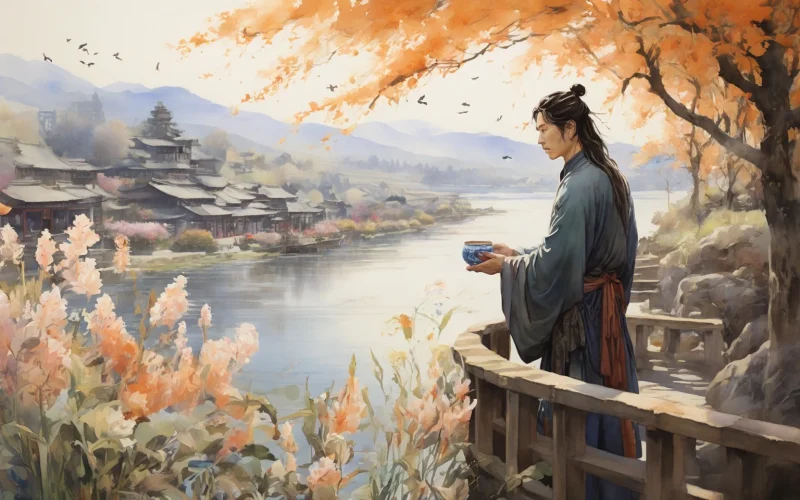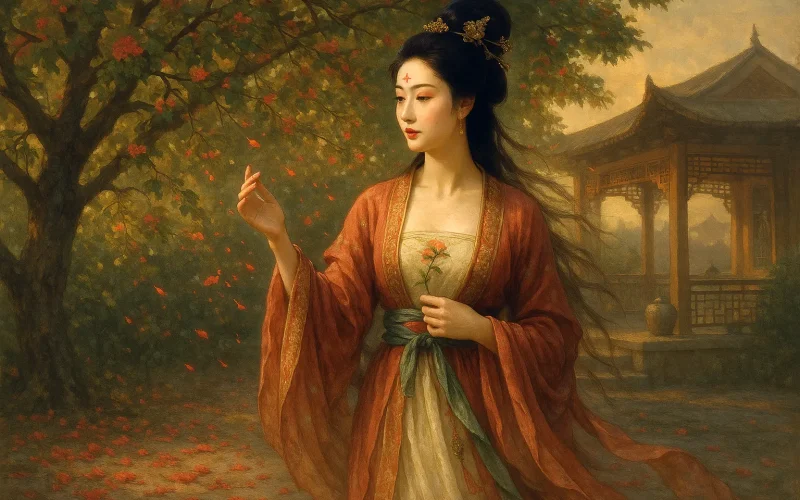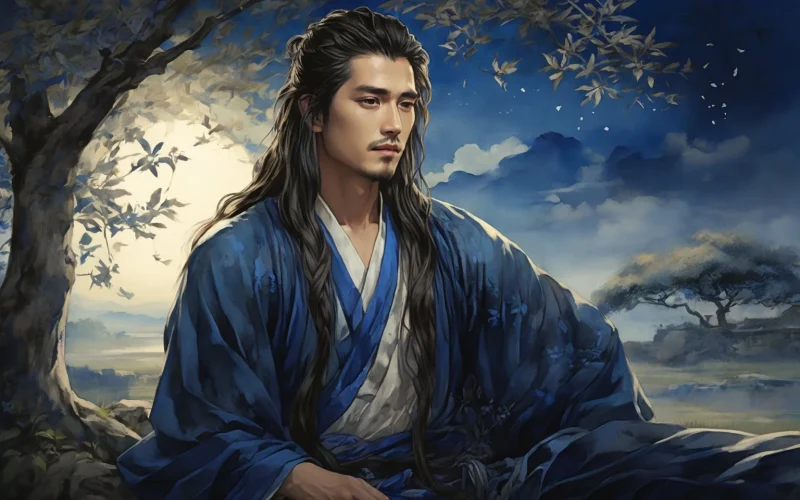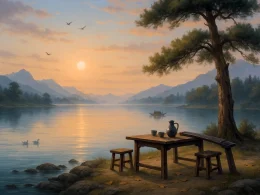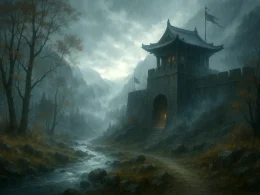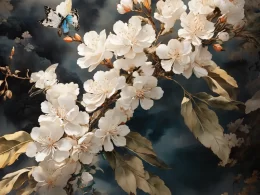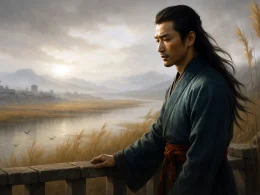Back from the court from day to day, I pawn spring gown
To get drunk by the riverside where I go down.
In every wine shop I have a debt to pay;
It's rare to live to seventy since olden day.
Deeper and deeper amid flowers go butterflies;
Slowly and slowly on water skim dragonflies.
I will enjoy the present with those on the wing.
Do not let pass away any delightful thing!
Original Poem:
「曲江二首 · 其二」
杜甫
朝回日日典春衣,每日江头尽醉归。
酒债寻常行处有,人生七十古来稀。
穿花蛱蝶深深见,点水蜻蜓款款飞。
传语风光共流转,暂时相赏莫相违。
Interpretation:
In the year 758 (the first year of the Qianyuan era), the An Lushan Rebellion had not yet been fully quelled. Although Chang’an had been reclaimed, the country remained in turmoil. Du Fu, whose career was fraught with difficulties, found himself adrift and deeply frustrated by the corruption of the times. As he wandered along Qujiang, the beauty of late spring stirred his emotions, prompting him to compose this poem. In it, he expresses his sorrow over his unfulfilled aspirations and his lamentation on the fleeting nature of life.
First Couple: “朝回日日典春衣,每日江头尽醉归。”
Each day after court, I pawn my spring garments for wine, drinking to excess by the river before staggering home.
Through a plain and direct style, the poet reveals his impoverished state, where he must pawn his seasonal clothes simply to afford wine. Spring garments, which should be worn at this time of year, are instead sold, highlighting the poet’s destitution. More than just financial hardship, these lines convey a sense of disillusionment and frustration at his situation.
Second Couple: “酒债寻常行处有,人生七十古来稀。”
Debts for wine are common wherever I go; reaching seventy has always been a rarity in human life.
The poet normalizes being in debt for wine, reflecting his resignation to life's hardships. The final line, “Reaching seventy has always been rare,” appears simple but is deeply poignant, conveying his lament for the brevity of life and the unfulfilled ambitions that accompany it. Having struggled in his career while witnessing the decline of the nation, Du Fu turns to drinking as a means of escape, revealing a profound sense of sorrow.
Third Couple: “穿花蛱蝶深深见,点水蜻蜓款款飞。”
Butterflies dance gracefully among the flowers, while dragonflies skim gently across the water.
With vivid and picturesque imagery, these lines paint a scene of Qujiang in spring, filled with movement and life. The fluttering butterflies and delicate dragonflies create a serene, harmonious picture of nature. However, this beauty is fleeting—just as spring will soon pass, so too does life itself. Through this imagery, the poet subtly conveys his awareness of the impermanence of both nature and human existence.
Fourth Couple: “传语风光共流转,暂时相赏莫相违。”
I send word to the fleeting spring—let us linger together a while, appreciating each other before we must part.
By personifying the spring scenery, the poet expresses his deep reluctance to let go of the passing season. His plea to prolong this moment of beauty is filled with both longing and helplessness, mirroring his own struggles with time, missed opportunities, and an uncertain future.
Writing Characteristics:
- Emotion Woven into Imagery: The poet masterfully blends his emotions with the natural scenery, allowing the melancholic beauty of spring to reflect his own sorrow. This fusion of setting and sentiment enriches the poem with both visual elegance and profound emotion.
- Gradual Progression, Deep Implications: The poem begins with mundane struggles—pawning clothes for wine—before transitioning into reflections on life’s brevity. From there, it moves to the beauty of nature, culminating in an emotional plea to preserve fleeting moments. This layered approach enhances the depth and impact of the poem.
- Contrast to Highlight Inner Conflict: The juxtaposition of poverty and indulgence in wine, of vibrant spring scenery against its inevitable passing, enhances the emotional weight of the poem. These contrasts sharpen the poet’s lament and make his feelings of loss and resignation more pronounced.
Overall Appreciation:
This poem, written amid Du Fu’s career setbacks and the nation’s turmoil, reflects his disillusionment through his indulgence in drinking. The first half of the poem captures his personal hardships, while the second half shifts to the beauty of spring, ultimately concluding with an emotional farewell to the transient season. The poem’s restrained yet deeply evocative language conveys not only the poet’s personal grief but also the broader decline of his era.
Insights:
Through the imagery of shifting spring scenery, Du Fu expresses his profound contemplation on the impermanence of life and the transient nature of worldly affairs. His own struggles with poverty and career disappointments serve as a reflection of the broader political corruption and instability of his time. The poem carries emotions of frustration over unfulfilled ambitions, sorrow over life’s brevity, and helplessness in the face of time’s passage. These layered sentiments make the poem deeply thought-provoking, offering a poignant glimpse into the uncertainties of his era.
Poem translator:
Xu Yuan-chong (许渊冲)
About the poet
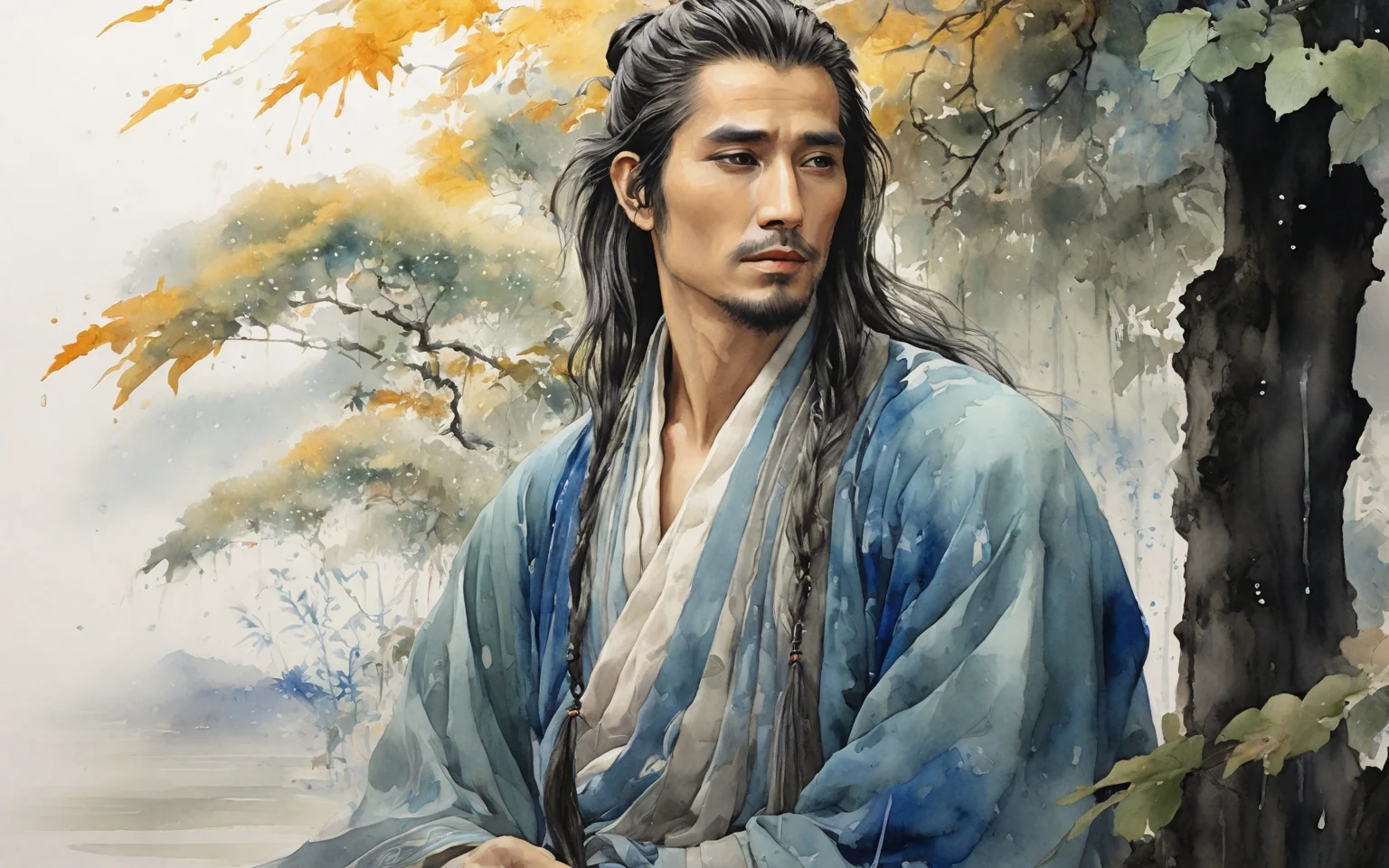
Du Fu (杜甫), 712 - 770 AD, was a great poet of the Tang Dynasty, known as the "Sage of Poetry". Born into a declining bureaucratic family, Du Fu had a rough life, and his turbulent and dislocated life made him keenly aware of the plight of the masses. Therefore, his poems were always closely related to the current affairs, reflecting the social life of that era in a more comprehensive way, with profound thoughts and a broad realm. In his poetic art, he was able to combine many styles, forming a unique style of "profound and thick", and becoming a great realist poet in the history of China.






